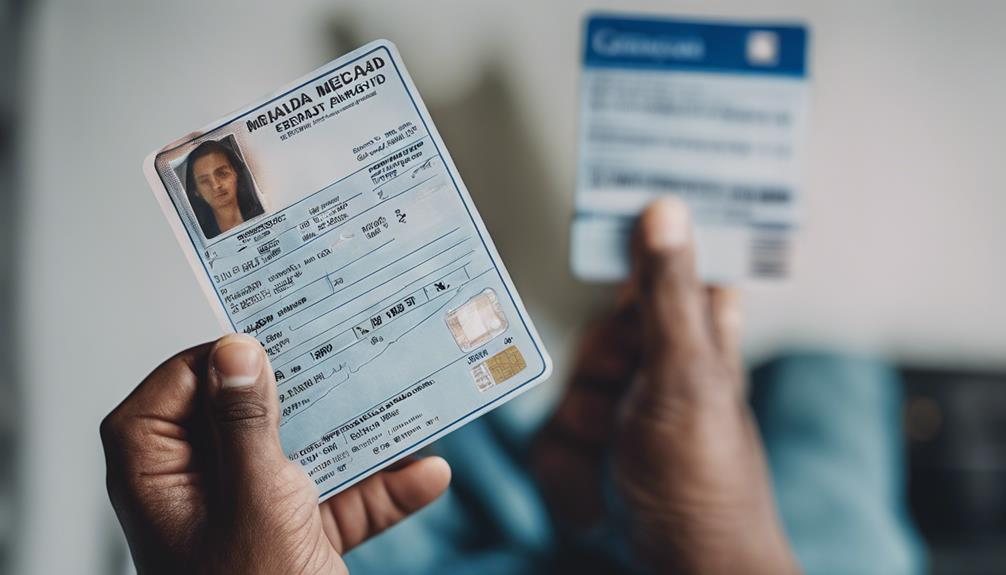When applying for Emergency Medicaid in Georgia, make sure you have these documents ready: valid photo ID matching your application, proof of income like recent pay stubs or tax returns, documents proving Georgia residency, and proof of the medical emergency such as hospital records and medical bills. Include additional supporting documents like previous medical bills and family support letters. These documents are essential for a smooth application process. Having them ready will help streamline your application and ensure timely assistance.
Proof of Identity
To apply for Emergency Medicaid in Georgia, you must provide proof of your identity. When verifying your ID, ensure you have a valid government-issued photo ID, like a driver's license or passport. If your name has changed due to marriage or any other reason, bring along legal documents such as a marriage certificate or court order to support this change. It's essential that the name on your ID matches the name on your application to avoid any delays in the process.
If you're unable to provide the required ID verification due to special circumstances, such as being a survivor of domestic violence, the Medicaid office may have alternative methods to confirm your identity. Don't hesitate to reach out and explain your situation so they can assist you accordingly.
Income Verification
When applying for Emergency Medicaid in Georgia, you'll need to verify your income as part of the process. To confirm your income, you can provide documents such as pay stubs or tax returns. Pay stubs are a detailed breakdown of your earnings for a specific pay period, showing deductions and net pay. They offer a snapshot of your income and are commonly accepted as proof of earnings.
Tax returns, on the other hand, provide a comprehensive overview of your financial situation, including income from various sources, deductions, and credits. These documents are crucial in determining your eligibility for Emergency Medicaid by assessing your financial need.
When submitting pay stubs, ensure they're recent and cover a consistent period to reflect your current income accurately. If using tax returns, provide the most recent filing to present a comprehensive view of your financial status. By verifying your income through these documents, you help the Medicaid authorities assess your financial situation promptly and accurately, expediting your application process.
Residency Documentation
Verifying your residency is a crucial step in the Emergency Medicaid application process in Georgia. To prove your residency, you'll need to provide documentation that verifies your legal presence in the state. Accepted forms of address verification include utility bills in your name or a lease agreement for your current residence. These documents serve as evidence that you reside in Georgia and are essential for your application to be processed promptly.
When submitting utility bills, ensure they're recent and display your current address. Similarly, if providing a lease agreement, make sure it's up to date and clearly shows your name and address.
Medical Emergency Proof
Ensure you provide documentation that validates the medical emergency you're experiencing as part of your Emergency Medicaid application in Georgia. Hospital records, affidavits, emergency room visits, and medical bills are crucial pieces of evidence to support your application.
Hospital records are essential as they detail the medical treatment you received, the severity of your condition, and the dates of your visits. Affidavits from healthcare providers can provide additional confirmation of the emergency situation you faced.
Emergency room visits are significant indicators of urgent medical care needed. Medical bills serve as concrete proof of the expenses incurred due to the medical emergency.
When submitting these documents, make sure they clearly demonstrate the immediacy and seriousness of your medical situation. Providing thorough and accurate proof of your medical emergency will strengthen your Emergency Medicaid application in Georgia.
Additional Supporting Documents
For a more comprehensive application, consider including additional supporting documents that can further substantiate your medical emergency situation when applying for Emergency Medicaid in Georgia.
Providing previous medical bills related to your emergency treatment can help demonstrate the urgency and necessity of the care you received. These bills serve as concrete evidence of the medical expenses you have incurred, strengthening your case for Emergency Medicaid assistance.
Additionally, including letters of support from family members detailing the impact of your medical emergency on your ability to work or care for yourself can provide a more holistic view of your situation. Family support letters can offer valuable insights into the challenges you're facing and the need for urgent medical assistance.
Conclusion
As you gather your documents for the emergency Medicaid application in Georgia, remember that each piece of paper tells a story.
Your proof of identity is like the cover of a book, your income verification is the plot, and your residency documentation is the setting.
With each document, you're painting a picture of your need for assistance during a medical emergency.
Stay strong and keep pushing forward – help is on the way.
